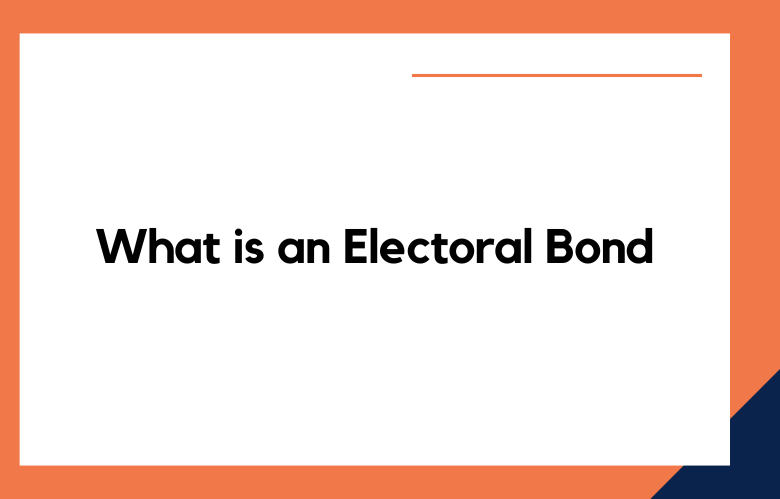An Electoral Bond is a financial instrument designed to provide a transparent yet anonymous channel for individuals and corporations to donate funds to political parties. Introduced to mitigate the risks of corruption and unaccounted money infiltrating political funding, these bonds represent an innovative approach to political donations.
What is an Electoral Bond?
A designated national bank typically issues Electoral Bonds, which are available for purchase by any citizen or entity of a country. Their unique feature is their anonymity; the donors’ identities remain confidential, safeguarding them from potential political backlash or undue influence.
However, the receiving political party must deposit the bonds into a designated account, ensuring the funds are traceable and accounted for within the political financing system.
The bonds have a fixed validity period, during which they can be redeemed by registered political parties that have secured a minimum percentage of votes in the previous election. This criterion ensures that only parties with demonstrable public support can benefit from these funds, promoting democratic legitimacy in the funding process.
Electoral Bonds aim to balance the need for transparency in political donations and the protection of donor privacy. By channeling donations through an official banking institution, these bonds seek to eliminate the influx of black money in politics, thereby enhancing the integrity of political financing.
Despite their intended benefits, Electoral Bonds are subject to debate and scrutiny, particularly concerning the potential for misuse and the true extent of transparency they offer in the political funding landscape.
Unveiling the Mysterious World of Electoral Bonds
Electoral bonds represent a novel financial instrument introduced to provide a transparent funding mechanism for political parties in some countries. These instruments ensure that donations to political parties are accounted for and not sourced from dubious origins. Here’s a closer look at how electoral bonds work and their impact on the political funding landscape.
Concept and Purpose
Electoral bonds are bearer instruments similar to promissory notes that individuals or corporations can purchase from authorized banks. These bonds are then donated to a political party of the donor’s choice, which can cash them through its verified accounts.
The primary purpose of electoral bonds is to bring more transparency and accountability to political donations, moving away from traditional cash donations, which can be challenging to trace and could potentially include funds from illegitimate sources.
Anonymity and Transparency
One of the unique features of electoral bonds is the anonymity they provide donors. While bank transactions ensure a documented money trail, the donor’s identity is kept anonymous, ostensibly to protect them from any potential backlash or undue influence.
This anonymity is a double-edged sword; it encourages donations from individuals and entities who wish to contribute without public disclosure, but it also raises concerns about the possibility of undisclosed, potentially undue influence on political parties by anonymous donors.
Usage and Restrictions
Electoral bonds have specific usage restrictions to ensure that only legitimate, recognized political parties can benefit from them. For instance, they are often made available only to parties registered and recognized by election commissions that have secured a minimum percentage of votes in previous elections. This ensures that the funds are channeled to established parties that have demonstrated a degree of public support.
Criticisms and Controversies
Despite the intended transparency and accountability, electoral bonds have faced criticism from various quarters. Critics argue that allowing donors to remain anonymous makes it challenging to ascertain whether the funds are being sourced from ethical and legal avenues. There’s also concern that without disclosure of donors, large corporations or individuals could wield undue influence on political parties and their policies without public knowledge or oversight.
Impact on Political Funding
Electoral bonds have undoubtedly revolutionized political funding in regions where they are used, providing a cleaner, more documented avenue for financial contributions to political parties. They can potentially reduce the inflow of black money into the political system and make political funding more transparent. However, the effectiveness of electoral bonds in achieving these goals continues to be a subject of debate, contingent on the balance between donor anonymity and the transparency of political funding.
Decoding the Secrets Behind Electoral Bonds
Electoral Bonds, a novel financial mechanism introduced in several democracies, aim to revolutionize political funding by infusing greater transparency and accountability while safeguarding donor anonymity.
These bonds serve as a conduit for individuals and corporations to contribute to political parties, striking a delicate balance between political finance transparency and donor identity protection. This unique blend of features makes Electoral Bonds a subject of intense discussion and analysis.
Anonymity vs. Transparency
One of the most intriguing aspects of Electoral Bonds is their ability to maintain donor anonymity. This feature prevents any potential reprisal or undue influence from public disclosure of political donations. This feature encourages more entities to contribute, potentially leading to a healthier funding environment for political activities.
However, this anonymity raises concerns about the transparency of political funding. Critics argue that it could obscure the source of political donations, possibly allowing undisclosed corporate or foreign influences to sway domestic politics.
Regulatory Framework and Oversight
Electoral Bonds operate within a stringent regulatory framework, where only designated banks are authorized to issue and redeem them. The bonds are available for purchase during specific windows and have a limited validity period, during which they can be donated to eligible political parties.
These parties must deposit the bonds into a designated account, ensuring the funds are officially recorded and used for legitimate political activities. The oversight mechanism is designed to prevent misuse, but the effectiveness of this system is a subject of ongoing debate.
Impact on Political Funding Landscape
The introduction of Electoral Bonds has the potential to alter the landscape of political funding significantly. Routing donations through an official banking channel aims to curb unaccounted cash flow into political campaigns, thereby reducing corruption and increasing transparency. However, the impact of these bonds on the political funding landscape is multifaceted, potentially affecting the dynamics of political competition, the relationship between businesses and politics, and the overall trust in the political system.
Ethical and Democratic Considerations
At the heart of the debate surrounding Electoral Bonds are fundamental ethical and democratic considerations. The balance between donor privacy and public transparency raises questions about the best practices in democratic financing. Ensuring that political parties have access to funding is crucial for a vibrant democracy, as is maintaining public trust in the electoral process. The challenge lies in designing a system that supports both these objectives and promotes a healthy democratic environment.
An Insider’s Guide to Electoral Bonds
Electoral Bonds were introduced in India in 2017 to reform political funding and bring transparency. The scheme allowed individuals and organizations to purchase bonds from designated banks and anonymously donate them to registered political parties. While the initiative aimed to create a structured and regulated mechanism for political donations, it faced criticism for potentially enabling money laundering and providing an unfair advantage to larger political parties.
The process of purchasing and donating Electoral Bonds was relatively straightforward. Donors could buy bonds from authorized branches of the State Bank of India (SBI) in denominations ranging from Rs. 1,000 to Rs. 1 crore. These bonds had a validity of 15 days, during which donors could give them to political parties of their choice. Recipient parties then redeemed the bonds through their verified accounts, allowing the funds to be transferred directly into their bank accounts.
Everything You Need to Know About Electoral Bonds
Electoral Bonds were introduced in India in 2017 to reform political funding and bring transparency. These bonds allowed individuals and organizations to anonymously donate to registered political parties, creating a structured and regulated mechanism for political donations. However, the scheme faced criticism for potentially enabling money laundering and providing an unfair advantage to larger political parties.
The process of purchasing and donating Electoral Bonds was relatively simple. Donors could buy bonds from authorized branches of the State Bank of India (SBI) in denominations ranging from Rs. 1,000 to Rs. 1 crore. The bonds had a validity of 15 days, during which donors could give them to political parties of their choice. Recipient parties then redeemed the bonds through their verified accounts, allowing the funds to be transferred directly into their bank accounts.
The Truth About Electoral Bonds Revealed
Electoral Bonds, a relatively new financial instrument introduced in several democracies, have sparked considerable debate and scrutiny. Designed to revolutionize political donations, these bonds aim to ensure a cleaner flow of funds into the political arena, balancing donor anonymity with the demand for financial transparency in political contributions.
The essence of Electoral Bonds lies in their ability to cloak the identity of donors, allowing individuals and corporations to support political entities without the fear of reprisal or unwarranted attention.
At the core of the Electoral Bond system is a structured and formalized process for political donations. These bonds can be donated anonymously to political parties and are obtainable from designated banks during specific time windows.
Parties can then redeem the bonds for funds but must do so through verified accounts, ensuring a trail for regulatory oversight and public accountability. This system seeks to eliminate the traditional under-the-table donations plaguing political financing, replacing them with a transparent mechanism that respects contributors’ privacy.
Exploring the Controversy Surrounding Electoral Bonds
Electoral Bonds, introduced in India in 2017, aimed to reform political funding by allowing individuals and organizations to donate anonymously to registered political parties. The scheme, however, faced significant controversy for potentially enabling money laundering and providing an unfair advantage to larger political parties. Critics argued that the anonymity provided to donors compromised transparency and accountability, raising concerns about the integrity of the democratic process.
In February 2024, India’s Supreme Court struck down the Electoral Bond scheme, citing concerns over transparency, accountability, and potential misuse. The court ordered the government-owned State Bank of India to stop issuing these bonds and provide details of donations made through them to the Election Commission of India.
The Power of Electoral Bonds: A Closer Look
Electoral bonds represent a transformative approach to political funding, enhancing transparency and accountability while maintaining donor anonymity. As we delve deeper into the mechanics and implications of electoral bonds, it becomes evident that they wield significant power in shaping the landscape of political finance. Here’s a closer examination of their characteristics, benefits, and the complex dynamics they introduce to political funding.
Conclusion:
Electoral Bonds were introduced in India in 2017 to bring transparency and accountability to political funding. The scheme allowed individuals and organizations to purchase bonds from designated banks and donate them anonymously to registered political parties. The goal was to create a structured and regulated mechanism for political donations while ensuring the donors’ privacy.
While Electoral Bonds were intended to reform the political funding landscape, the scheme faced criticism for potentially enabling money laundering and providing an unfair advantage to larger political parties. In February 2024, India’s Supreme Court struck down the Electoral Bond scheme, citing concerns over transparency, accountability, and potential misuse. The decision marked a significant development in India’s efforts to ensure a fair and democratic political system.
Call: +91 9848321284
Email: [email protected]











